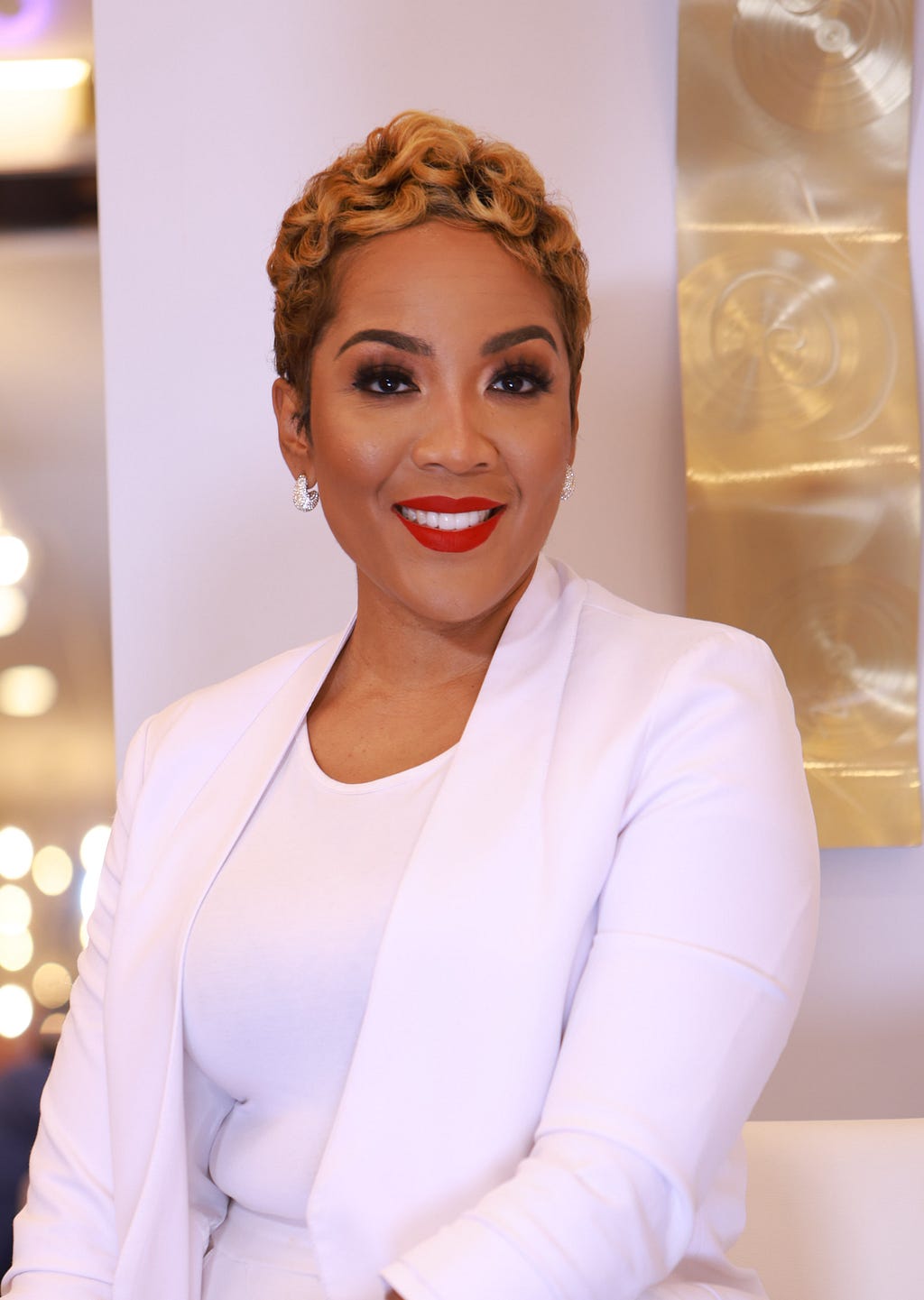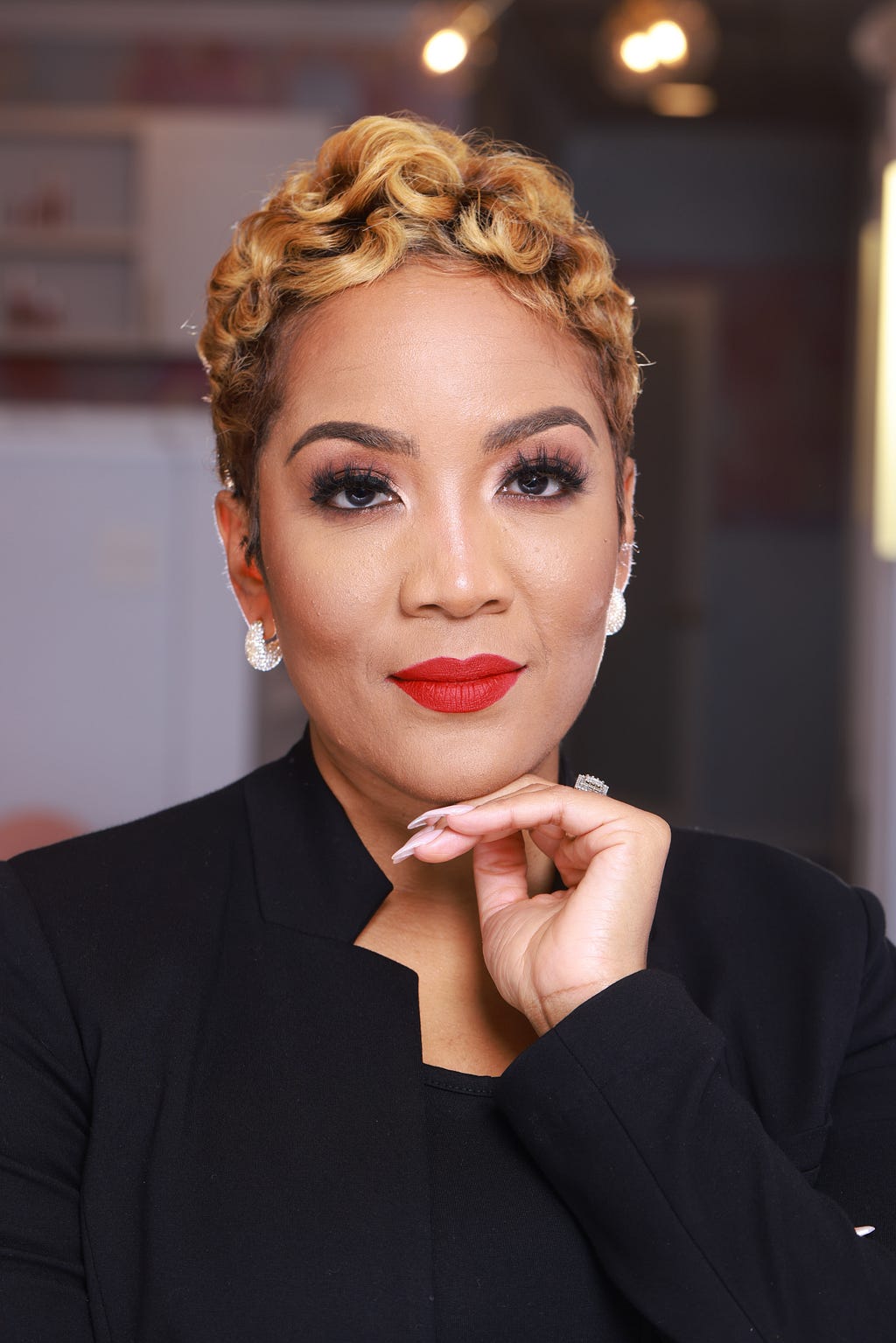An Interview With Brooke Young & Yitzi Weiner

Practice being assertive. In my experience instead of ignoring a team member’s overbearing behavior when they’re overstepping boundaries, I confidently communicated that I would appreciate it if he would respect my specific boundaries going forward.
In today’s society, the tendency to prioritize others’ needs and expectations over one’s own can lead to significant emotional and psychological challenges. In this series, we would like to explore the complex dynamics of people-pleasing behavior and its impact on individual well-being and relationships. We would like to discuss the root causes of people-pleasing behavior, its effects on personal and professional life, and practical steps for cultivating healthier relationships and self-esteem. We hope that this series can provide insights, strategies, and real-life experiences that can help individuals navigate and overcome the pitfalls of being a people pleaser. As part of this series, we had the pleasure of interviewing Rainie Howard.
Rainie Howard, a renowned bestselling author, globally sought-after keynote speaker, and visionary in personal development, possess over seventeen years of profound expertise. As the President and CEO of InspiredFlow LLC, Rainie leads a dynamic team that has positively impacted millions of people worldwide.
Throughout her notable career, Rainie has crafted and delivered impactful programs for universities, Fortune 500 corporations, educational symposiums, and esteemed professional groups. She has contributed her insights to major entities like FOX, NBC, Women’s World, and ABC Networks, reinforcing her reputation as an authority in relationship building, women empowerment, emotional intelligence, self-care, and mental health awareness.
Beyond her professional accomplishments, Rainie is celebrated as an award-winning humanitarian and mentor, guiding individuals towards holistic growth in mental, emotional, and spiritual realms, fostering joyous lives and fulfilling relationships. Balancing her roles as a devoted wife, nurturing mother, and inspiring leader, Rainie has authored numerous impactful books, including “You Are Enough” and “Sis Be Nicer to Yourself” along with her latest work, “The Love Habit.”
As the esteemed host of “The Rainie Howard Show” podcast, Rainie continues to uplift and empower her audience with her inspirational messages. Additionally, she has spearheaded various privately held ventures in sectors covering education, nonprofit, and personal development, furthering her mission to create positive change on a global scale.
Thank you so much for your time! I know that you are a very busy person. Our readers would love to “get to know you” a bit better. Can you tell us your “Origin Story”? Can you tell us the story of how you grew up?
Like many children, I enjoyed growing up surrounded by love. I enjoyed making art, playing outside, and singing and dancing. However, my childhood also included uncertainty, chaos, and instability. This led to me being afraid of the uncertainties in life. I developed fear and anxiety at such an early age.
Before I turned five, I lived through a toxic relationship. After my mom decided to end the relationship with my dad, things got bad. I remember my mom’s small apartment where it all happened — the loud fights, the police coming after the chaos. My father was unstable, struggled with drugs, and was possessive. He’d break in at night, paranoid and jealous. Despite being afraid, I loved him deeply because he made me feel like a precious princess.
Later in elementary school I begin to experience shame and guilt due to my dad’s behavior and that led to my struggle of low self-esteem and insecurity. This resulted in toxic friendships and negative relationships where I experienced bullying. Becoming a people pleaser was my way to survive in relationships. I thought it was my responsibility to make others happy.
Can you tell us a bit about what you do professionally, and what brought you to this specific career path?
The work that I do began in October or 2008 when I founded a non-profit organization called Sisters of Hope. I was inspired to help young girls who struggled with low self-esteem and depression, which was my struggle in seventh grade after being bullied by one of my peers. I begin writing curriculum for youth enrichment programs that inspired girls to be confident and empowered, giving them journaling and mental health enrichment techniques. After years of offering empowerment programs for schools, and youth focused organizations, I was inspired to start a personal development blog in 2013. This led to my relationship message going viral reaching over 1 million people on Facebook in 2015. I wrote 3 self-published books on relationships in the following year. Writing books, hosting my podcast, and having live conversations, and events that speak to my audience and inspired readers to heal and grow, led to a 7-figure online ecommerce business. Now as a best-selling author and entrepreneur, and wife and mother of two college students, I’m excited to make an even greater impact.
Thank you for all that. Let’s now turn to the main focus of our discussion about People Pleasing. To make sure that we are all on the same page, let’s begin with a simple definition. What does “People Pleaser” mean to you?
People pleasing is when you deny your needs to appease another person. It’s a pattern behavior of prioritizing other people above yourself which often leads you feeling depleted, exhausted, or stressed.
On the surface, it seems like being a person who wants to please others is a good thing. Can you help articulate a few of the challenges that come with being a people pleaser?
There’s nothing wrong with wanting to please another person. There are things I do to show my love and appreciation for my husband and children that they enjoy. However, being a people pleaser is much different. The challenge comes when your tendencies are solely for the pleasing and receiving validation from another person is more important than your personal needs. It becomes a problem when you start neglecting yourself for the approval of another person. This level of people pleasing becomes a cycle of appeasing others while ignoring your authentic desires. You lose yourself in the cycle of obsessively giving to another person.
Does being a people pleaser give you certain advantages? Can you explain?
In my experience as a recovering people pleaser, the advantage I had was the belief that if I focused on pleasing others, I would eliminate drama and conflict. I didn’t like for a person to be mad at me. I wanted to be accepted and liked so badly that I was willing to find out what others wanted and do what I could to please them so that they would never be upset with me. That didn’t help at all because instead of eliminating conflict, my people pleasing behavior was subconsciously inviting people to take advantage of me and use me.
Can you describe a moment in your life when you realized that your own people-pleasing behavior was more harmful than helpful?
I was working on a business project and one of the leaders on our team had an overbearing personality. I noticed he started inserting himself in tasks that I led. He would change the meeting agenda without communicating with me and he started disregarding my suggestions and ideas. Instead of being angry with him and getting upset, I begin to analyze myself. I asked myself what could I have done to give the impression that it’s okay for him to do these things? Then I realized, when I first met him, I really wanted the opportunity to work on the project and partner with the company, therefore I did my best to make a great impression. Those old people pleasing habits were unleashed and there was red flag behavior from him that I dismissed. I was too nice which can be an issue and I talk about the importance of having healthy conflict in my book, “The Love Habit.” It’s okay to be kind and friendly, however, it’s unrealistic to be that way all the time. Sometimes you will be serious, direct, and firm and speak up when sometime isn’t right. This can be difficult for people pleasers.
In your opinion, what are the common root causes of people-pleasing behavior?
I believe insecurity and fear are the root causes of people peopling behavior. The fear of others not approving of you is the big drive behind people pleasing behaviors. It results in you changing yourself to fit another person’s needs.
How does people-pleasing behavior impact personal relationships?
It creates unauthenticity in your personal relationships. When you prioritize another person’s needs over your own needs it leads to you suppressing your true self. When person pleasing has been occurring over years in long term relationships it can create resentment.
How does people-pleasing behavior impact professional relationships?
In professional relationships, people pleasing can lead to burnout and overcommitting yourself due to the struggle to say no. This can also lead to disrespect causing colleagues to take advantage of you.
How can long-term people-pleasing behavior impact an individual’s mental health?
Long-term people pleasing can lead to mental health issues such as stress, anxiety, and emotional exhaustion. It can also lead to a loss of identity. When you spend years focusing so much of your time and energy on pleasing others, you can lose yourself due to a lack of personal direction and purpose.
In your experience, what is the role of self-awareness in overcoming people-pleasing tendencies, and how can individuals cultivate it?
It’s important to observe yourself and identify your triggers. For example, my triggers have been the need for approval and the fear of rejection. The great desire to do a good job on the business project led to the people pleasing. Having self-awareness can assist with recognizing patterns and learning to do things differently.

Here is the primary question of our discussion. Based on your experience or research, what are the “Five Strategies Or Techniques That Can Help Individuals Break Free From The Cycle Of People-Pleasing”? If you can, please share a story or an example for each.
1 . Practice being assertive. In my experience instead of ignoring a team member’s overbearing behavior when they’re overstepping boundaries, I confidently communicated that I would appreciate it if he would respect my specific boundaries going forward.
2 . Prioritize your self care first. Instead of neglecting your own well being by putting your job and relationships above yourself, create a self-care routine and make it your top priority.
3 . Communicate your boundaries. Years ago, I struggled with saying no and that led to burnout. I was seeking approval above protecting my time and well-being. Now, I communicate what’s best for me by saying no when it’s necessary.
4 . Connect with professionals. Hiring a personal trainer, life coach and therapist has helped with my self-care plans, and it has supported me in creating healthy boundaries and overcoming people pleasing. Therapy has led to my understanding of childhood trauma and triggers that lead to people pleasing.
5 . Practice self-awareness. I have learned the importance of setting aside time to journal and reflect on my behavior and people pleasing tendencies, which that allowed me to heal and thrive in a newfound confidence and strength. My self-awareness has helped me understand myself more and enhance my mind, body, and spirit. This has led to improvement in my relationships as well.
What steps should people pleasers take to establish healthier boundaries?
Stay consistent with your daily self-care routine. Practice saying no when the request doesn’t align with your priorities. Practice self-awareness by understanding and identifying your personal limits.
How can someone who is naturally empathetic maintain their compassion while becoming more assertive?
You can combine your empathy personality with assertiveness. Example: When turning down a request, you can say, “I understand that you need help with this project, and I want to support you. However, I’m currently at full capacity and can’t take on any additional tasks. Perhaps we can find another solution together?”
What are the most common misconceptions about people pleasers, and how do these misconceptions affect their journey toward recovery?
One of the biggest misconceptions with people-pleasers, are that they are often seen as just being exceptionally kind and nice, without any underlying issues. This misconception can lead to a lack of recognition of the deeper issues at play, such as low self-esteem or fear of rejection. It can prevent people-pleasers from seeking help or realizing the need for change, as they might not see their behavior as problematic.
What role can therapy or counseling play in helping individuals overcome people-pleasing behavior?
Therapy and counseling can address and heal the underlying issues such as low self-esteem, anxiety and trauma that may have contributed to the people-pleasing behavior.
You are a person of great influence. If you could start a movement that would bring the most amount of good to the most amount of people, what would that be? You never know what your idea can trigger. 🙂
One impactful movement could be a Global Mental Health and Well-Being Initiative. To promote mental health awareness, reduce stigma, provide education, and increase access to mental health services globally, ensuring that everyone, regardless of location or background, has the opportunity to achieve mental well-being. The vision of the movement is a world where mental health is universally recognized as essential to overall health, and where every individual has access to the resources and support, they need to thrive mentally and emotionally.
How can our readers further follow your work online?
Visit my website at www.Rainie Howard.com
Facebook: @Rainie.Howard.Author
Instagram: @RainieHoward
YouTube: @RainieHoward
Thank you so much for sharing these important insights. We wish you continued success and good health!
About the Interviewers:
Brooke Young is a multipassionate publicist, public speaking mentor, and communication consulting. She works with a wide range of clients across the globe, and across a diverse range of industries, to help them create, develop, and promote powerful messages through heart-centered storytelling. She has formerly worked On-Air with FOX Sports, competed in the Miss America Organization, and is the Author of a Children’s Book. She frequently works with children as a professional speaker where she educates on Volunteering and Therapy Dogs. She has over a decade of professional performing background and finds joy in sparking creative passions for her clients.
Yitzi Weiner is a journalist, author, and the founder of Authority Magazine, one of Medium’s largest publications. Authority Magazine is devoted to sharing in depth “thought leadership interview series” featuring people who are authorities in Business, Tech, Entertainment, Wellness, and Social Impact.
At Authority Magazine, Yitzi has conducted or coordinated thousands of empowering interviews with prominent Authorities like Shaquille O’Neal, Peyton Manning, Floyd Mayweather, Paris Hilton, Baron Davis, Jewel, Flo Rida, Kelly Rowland, Kerry Washington, Bobbi Brown, Daymond John, Seth Godin, Guy Kawasaki, Lori Greiner, Robert Herjavec, Alicia Silverstone, Lindsay Lohan, Cal Ripkin Jr., David Wells, Jillian Michaels, Jenny Craig, John Sculley, Matt Sorum, Derek Hough, Mika Brzezinski, Blac Chyna, Perez Hilton, Joseph Abboud, Rachel Hollis, Daniel Pink, and Kevin Harrington
Yitzi is also the CEO of Authority Magazine’s Thought Leader Incubator which helps business leaders to become known as an authority in their field, by interviewing prominent CEOs, writing a daily syndicated column, writing a book, booking high level leaders on their podcast, and attending exclusive events.
Rainie Howard of InspiredFlow On How to Recover From Being a People Pleaser was originally published in Authority Magazine on Medium, where people are continuing the conversation by highlighting and responding to this story.
